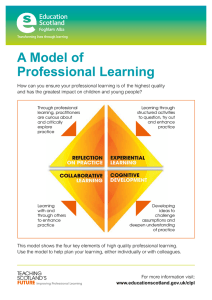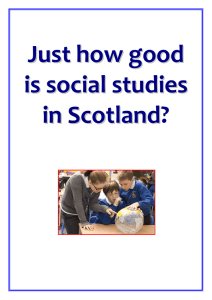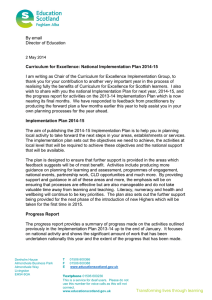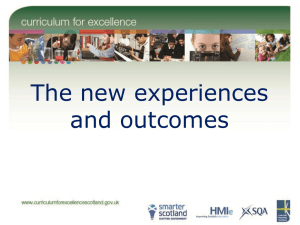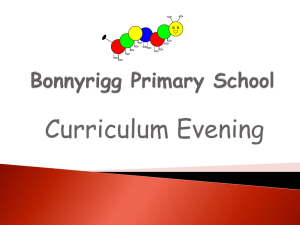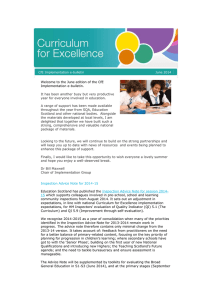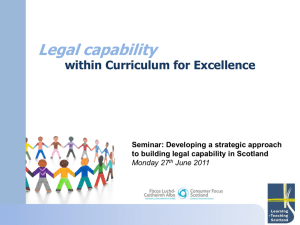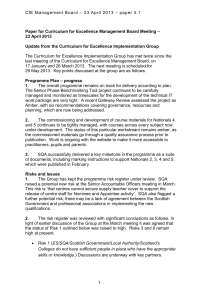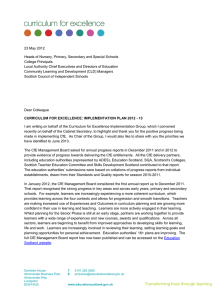Graeme Logan Slides - University of Strathclyde
advertisement
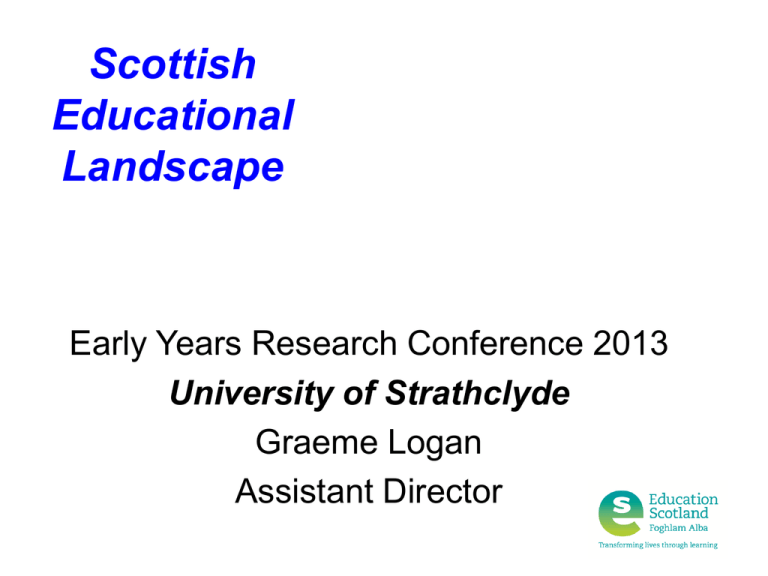
Scottish Educational Landscape Early Years Research Conference 2013 University of Strathclyde Graeme Logan Assistant Director Overview • • • • Policy landscape Early years policy developments Inspection evidence on early years Challenges and next steps Programme for Government 13/14 • • • • • • • • • • • • • Bankruptcy Consolidation Bill Budget Bill Community Empowerment and Renewal Bill Conclusion of Contracts Bill Courts Reform Bill Damages Bill Food Standards Scotland Bill Housing Bill Licensing Bill Mental Health Bill RCAHMS and Historic Scotland Merger Bill Revenue Scotland and Tax Powers Bill Scottish Welfare Fund Bill Education policy landscape • • • • • • • • Curriculum for Excellence Children and Young People’s Bill Post-16 Education (Scotland) Reform Bill New statutory regulations for CLD (Sept 13) Public Sector reform Opportunities for all/ developing workforce Welfare reform Career-long professional learning Corporate plan – our four pillars A decisive shift towards prevention A greater focus on ‘place’ to drive partnership, collaboration and local delivery Investing in people who deliver services through enhanced workforce development and effective leadership A more transparent public service culture which improves standards of performance TEACHING SCOTLAND’S FUTURE Moving from continuing professional development to the concept of career long professional learning www.educationscotland.gov.uk/clpl Policy into Practice #bestplacetogrowup Early years focus • Family learning • National Play Strategy Early Years Collaborative • • • • Improvement methodology Community Planning Partnerships Improving outcomes for under 3s Supporting children to meet developmental milestones Pre-schools since April 2008 – June 2013 789 centres NPF Results Satisfactory or above 712 90% Good or above 525 67% Very good or Did not meet above NPF criteria 218 77 28% 10% Inspection evidence Sept 2012 until June 2013 Strengths • Happy, motivated, confident children • • • • Staff Relationships Ethos Leadership ASPECTS for DEVELOPMENT • • • • • • • Literacy and numeracy Curriculum Self – evaluation Monitoring Assessing Tracking Children involved in their own learning Does our approaches to assessment prove or improve children’s learning, progress and achievement ? Tracking Your analysis and intervention to help every child make the best possible progress, based on a range of assessment evidence. Impact of systems and approaches Underachievement is immediately challenged, achievement is immediately celebrated. Professional Dialogue • What does CfE mean for you in your establishment? • What have been the major changes/ improvements for children so far? • What is you plan to continue with implementation? Key messages – self evaluation • Looking inwards, looking outwards, looking forwards • Smart, streamlined coherent approach which tells the story of the centre in a clear and evaluative way • Don’t spend all your time on the process of gathering and collating information • Keep evidence proportionate, impact-based, focused • Often the best sources of evidence are learning in action and talking with young people and staff • Discuss and moderate content, standards and expectations within CfE levels at every opportunity Key messages – strong practice is often… • • • • Precise, focused Forensic in the analysis of children’s progress Practice-based rather than just paper-based Able to generate specific strengths and areas for improvement, for example in relation to ‘active learning’ • Prioritises time and energy on learner experiences and outcomes What are some of the features of excellence in centres? • High quality leadership • A community of learning and learners • Staff who listen to children and act on what they see and hear www.bit.ly/earlyhome One example: the 5 C’s • • • • Control (is she in charge) Clarity (is she sure of her ground) Coherence (can I align my aspirations with hers) Concern (does she understand the challenges I face) • Consistency (will she adopt the behaviours she espouses?) Learning leadership from children It’s more fun to colour outside the lines Ask ‘Why?’ until you understand. Make up the rules as you go along. It doesn’t matter who started it. You sometimes have to take tests before you finish studying. If you want a kitten, start out asking for a horse. Keep knocking till someone opens the door. You can’t ask to start over when your losing. Excellence is the result of: caring more than others think is wise; risking more than others think is safe; dreaming more than others think is practical; and expecting more than others think is possible. www.educationscotland.gov.uk
